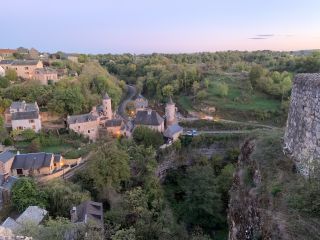Friends
In Praise of Helplessness
A Personal Perspective: The power of having no power.
Posted January 19, 2023 Reviewed by Michelle Quirk
Key points
- Helplessness opens you up to the kindness of the world.
- Asking for help is an opportunity to be cared for in a way you might not know you need.
- Power can close us off to connection.

“Hamburger meat,” I say to the sturdy woman with the ponytail behind the counter, wishing I knew the French word for either “hamburger” or “meat.”
My husband and I are here in France staying with our friends at their home in Bouzouls, a small town north of Toulouse which sits on the edge of a gorge created by the river Dourdou de Conques. I had walked up into town by myself this afternoon to get some ingredients to cook linguini Bolognese tonight for our friends as a sort of “thank you.” I had just purchased the pasta and sauce ingredients from a small épicerie and now here I was in the boucherie to get the meat.
“Je ne parle pas Francais,” I say apologetically and with an abysmal accent when the sturdy woman looks confused. “I don’t know how to say it in Francais, but I’m hoping to get a pound of hamburger meat.”
“Ah,” the woman says, then points next door to a small café with several outdoor tables that I realize must serve hamburgers.
“No,” I explain, “not…” I mime eating a hamburger. “I’m hoping to get it ground up.” Then I make a fist and push it around in a circle, miming grinding up meat.
Arriving here, “Don’t be a tourist,” I cautioned myself. Everyone hates tourists. The word ”tourist” seems to require a groan afterward or an exclamation from someone, “Oh God, tourists.” More important, don’t be an American tourist.
Now here I was loudly saying “Ham-burg-er” and then playing charades. What could be more American tourist than that?
I needed to come up with another way to communicate my request so… “Moooo.” I say, “Mooo,” putting my arms out like front legs and rocking back and forth in a way I hope appears distinctively bovine.
The woman, wearing a name tag that reads Bernice, starts laughing, “Moo?”
“Yes,” I say, excited, increasing the tempo of my bovine rocking, “Mooooo, cow, mooooo.”
Still laughing, Bernice, her ponytail flipping behind her, walks to the far end of the counter, “Oui oui viande hachée.”
“Hachée. Yes. Yes. One pound of hachée.”
“One pound is demi kilogram, le petit moins, oui?”
“Oui,” I say, scolding myself for not remembering they use the metric system here. But Bernice does not seem to mind. With smooth movements, she weighs and packages the meat, wrapping it in soft white paper, sealing it with a neat strip of tape down the middle. Then, holding the bundle with both hands, she extends it towards me, “J'espère que tu apprécies.”
I take the package, place it in my bag of other dinner items, and “merci,” I say. “Merci.”
“Moo,” Bernice calls as I walk towards the door and waves.
I leave the boucherie and walk down the Rue du Trou back to our friends’ home, but at a certain point, the road forks into three and I can’t remember which path I had taken to get here. I try the most likely one, which soon seems like the least likely one as all the old stone homes begin to look alike and none are quite right. Soon enough, I realize I am lost. And do not have my phone. And it’s getting darker.
I decide I need to ask for help, but from whom? The cobblestone streets are empty except for a couple of pheasants hopping around. But then as I turn the bend, I see a man and a woman, in their 70s maybe, both short and stout, with round ruddy faces, walking toward me. I would have guessed the two were brother and sister were they not squeezed so close together and walking arm and arm. They do not seem to be heading anywhere but appear to be simply strolling, their eyes scanning the night like lighthouses, steady, familiar, intimate with the scene.
“Excuse me,” I say, veering to the center of the cobblestone path, my body curved into an apology, hating to disturb their languid stroll, “can you help me?”
Both sets of eyes brighten, inviting.
Encouraged, I continue. “I’m lost.”
“Perdue,” the woman whispers into the man’s ear, explaining, her arm still entwined in his.
“Ah, perdue,” the man nods at me, curious.
I try to explain that I am visiting friends, had ventured out, and now was unable to locate their home. The couple seem to understand and ask me for the names of my friends. I tell them.
“Nous ne savons pas,” the man says, shaking his head.
“Ah,” I say, disappointed, then brighten, remembering, “They also have daughters… maybe you know them… Jessica and Bree?”
“Ah, yes Bree,” the woman nodded, “We know Mademoiselle Bree. ”
“You do?”
“Oui oui,” the gentlemen confirms and gestures for me to follow them. “Nous allons vous montrer.”
The woman links her arm in mine, and the three of us walk entwined down the stone streets through the darkening canyon. I was dependent on the kindness of strangers today, I think as we stroll, kindness I would not have seen had I not been so helpless. Then I wonder how much of the kindness of the world I miss because of my relative self-sufficiency. Back at home, I know the streets, I know the language. I don’t often have occasion to be dependent on others for the basics, so it’s possible I miss out on some of the basic goodness of people I encounter every day.
Our trio arrives in front of my friend’s home. I recognize it immediately by the wooden gate covered in climbing lilac and jasmine that rises up from the stone and the sign “méfiez-vous du chat fou [beware of insane cat].”
“Merci. Merci,” I say to the couple, putting my hands in prayer hands and bowing extravagantly.
“De rein,” they reply, smiling. Then the woman squeezes my arm and the two wander off into the night.
As I watch the wandering couple weave their way back toward the spot I met them, I think of a lyric from the Leonard Cohen song "Undertow": “My heart the shape of a begging bowl.” And I realize that tonight, in this small canyon town, under these stars that are just now showing themselves, my heart-shaped bowl has been filled.




